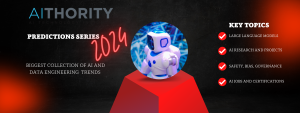Using AI Responsibly: U.S. Leads Efforts to Develop ISO/IEC 42001, AI Management System Standard
New Standard Now Available for Purchase via ANSI Webstore
A new international standard provides guidance for organizations of all kinds to use artificial intelligence (AI) systems responsibly: ISO/IEC 42001, Artificial intelligence – Management system, developed by the International Organization for Standardization / International Electrotechnical Commission (ISO/IEC) Joint Technical Committee (JTC) 1, Information technology, Subcommittee (SC) 42, Artificial intelligence. The U.S. has a leading role in JTC 1, with the American National Standards Institute (ANSI), the U.S. member body to ISO, serving as secretariat.

Recommended AI News: Cloudflare’s R2 Is the Infrastructure Powering Leading AI Companies
While AI is gaining traction across all sectors that utilize information technology, it poses risks to organizations that necessitate careful governance mechanisms. ISO/IEC 42001:2023 guides an AI management system to address the complexities of the technology, providing a framework for managing the risks and opportunities while supporting the responsible use of AI. The standard specifies requirements and provides guidance for establishing, implementing, maintaining, and continually improving an AI management system within the context of any organization—regardless of size, type, and nature—that provides or uses products or services that utilize AI systems.
The standard centers on a “Plan-Do-Check-Act” approach of establishing, implementing, maintaining, and continually improving AI; this system supports improved quality, security, traceability, transparency, and reliability of AI applications. Ultimately, the goal of the standard is to help organizations achieve the maximum benefits from AI, while reassuring stakeholders that systems that incorporate AI are being developed, governed, and used responsibly.
“ISO/IEC 42001:2023 is a first-of-its-kind AI international standard that will enable certification, increase consumer confidence in AI systems, and enable broad responsible adoption of AI,” said Wael William Diab, chair of SC 42. “This novel approach takes the proven management systems approach and adapts it to AI. The standard is broadly applicable across a wide variety of application domains and will help unlock the societal benefits of AI while simultaneously addressing ethical and trustworthy concerns.”
Recommended AI News: Cloudflare Equips Organizations with the Zero Trust Security They Need to Safely Use Generative AI
The standard was developed by stakeholders representing diverse interests, including representatives of the public and private sectors, regulators, technology experts, researchers, academia, and more. SC 42 is comprised of 63 countries, with more than one third from developing nations. Many members of SC 42 have stakeholders that will be predominately users of AI—contributing to a balanced standards developing environment that included both users and developers of the technology.
Recommended AI News: Cloudflare Releasing New Tools to Help Manage Gen AI Security Risks
[To share your insights with us, please write to sghosh@martechseries.com]

Comments are closed.